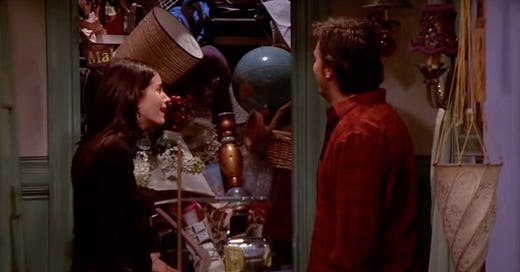Let's stop feeling ashamed of our clutter
It's in our nature to collect clutter.
“Your house is a pile of stuff with a cover on it. That’s all your house is: a place to keep your stuff while you go out and get more stuff.” – George Carlin
Ouch! But also: yeah, kinda...
Ok, here’s the story: Everyone struggles with clutter. Literally everyone. To wit:
I’m the most uptight, clutter-aware person I know and yet I regularly open a drawer or cabinet and realize it’s a total rat’s nest of clutter. Here’s the proof.
My friends with big fancy homes often have an even larger collection of stuff hiding under the fancy surfaces.
The guy living in his truck down the street struggles to maintain his mountain of belongings precariously stacked high into the sky.
Every mom I know bemoans the disastrous state of the house after kids spend the weekend at home.

The fact of the $11 billion professional organizing industry—not to mention the Container Store—gives us a hint that we collectively have a hard time managing our stuff.
I’m not saying the above are equivalent situations, just making the point that no matter your situation, dealing with Stuff is a fact of life. The second humans are able, they will accrue belongings, which they then have to figure out how to live with.
Why do we have this drive to acquire?
A Little Human History
In the early 2000s a detailed study of family living in the L.A. area was published in the book Life at Home in the Twenty-First Century. As the authors summarize in the chapter called Material Saturation:
This is the most materially rich society in global history, with light-years more possessions per average family than any preceding society….These decades of sustained consumer frenzy…play out in measurable and interesting ways within people’s homes, since the home is the storehouse for nearly everything families possess.
Turns out accruing stuff is in our DNA, and it makes perfect sense why. Humans have evolved to be Stuff collectors, and when you consider how difficult life was historically, it makes sense why.
I recently read the rapturous four-book series The Emigrants by Vilhelm Moberg, which details the emigration of a Swedish family in the 1850s to America. It bought to life how hard it was just 225 years ago to simply survive. Children were in danger of starving to death if there was a bad harvest year, leading many families to risk everything and undertake a harrowing months-long journey to start a new life in America.
At their destination, settlers needed to carve out a life in the wilderness. Materials were scarce so people had to figure out ways to build shelter using as few nails as possible. This is how I learned that log cabins don't require nails to build. If the immigrants were lucky enough to scrape together a few cents they’d journey all day to a store selling seeds for wheat. Which then they’d plant, care for, harvest, mill and eventually turn into bread. (Makes me feel exceptionally lazy for grousing that my favorite bakery won’t pre-slice their bread loaves for me.)

Most of human history was like this, rather than the Amazon-enabled plenty we live with today. Taking a broader perspective of human history, it makes sense that we are programmed to always be scanning our environment to find objects that might be useful, and that acquiring new objects makes us feel momentarily good.
I could’ve used any number of examples — early human history, modern tribes like the Marubo in the Amazon rainforest (a very different kind of Amazon-centric life), and so on — Swedish settlers just happen to be on my mind right now.
So why the history lesson?




